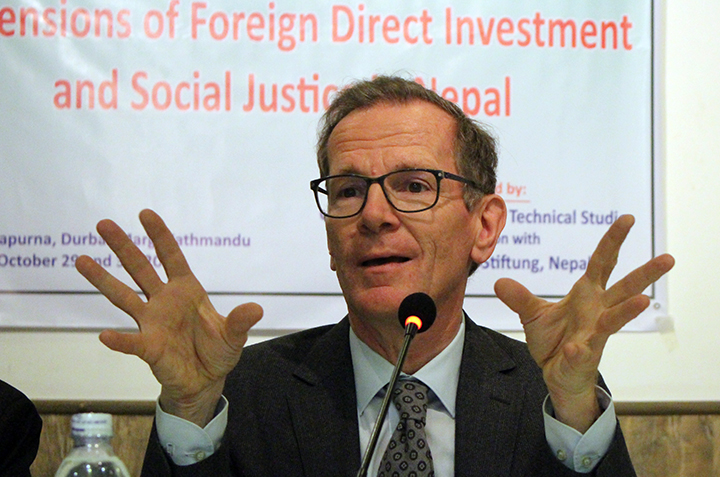
A two-day “National Seminar on Dimensions of Foreign Direct Investment and Social Justice in Nepal” was held in Kathmandu from 29th to 30th October, 2018.
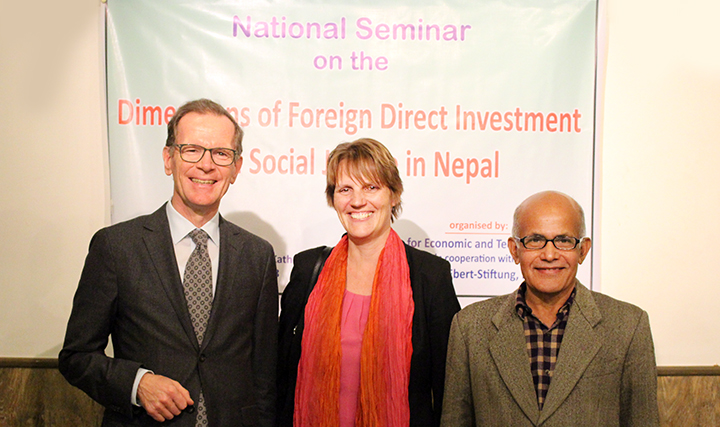
Altogether five papers were presented during the seminar. Three of these five papers covered Chinese, Indian and Western investment in the country. Two other papers were devoted to foreign direct investment (FDI) from Southeast Asia and West Asia and socially just development in Nepal and the role of FDI.
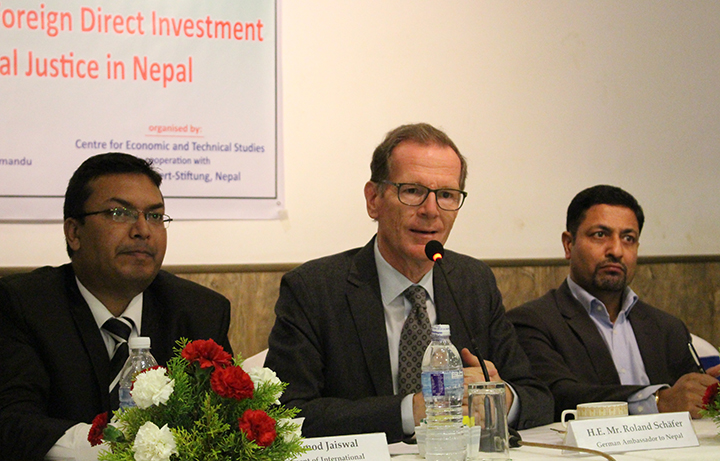
The ambassador of Germany to Nepal, Roland Schafer, chaired a session on “Socially Just Development in Nepal and the Role of FDI”. The panelists comprised Baljit Vohara of Louis Berger; Dr. Pramod Jaiswal from Tribhuvan University; and, Dr. Bijan Pant, a development economist.
Earlier, Dr. Rudra Sharma, advocate; Bijay Kant Karna, former Nepalese ambassador to Denmark; and Annette Schlicht, resident representative of Friedrich-Ebert-Stiftung Nepal Office, made welcome addresses.
Delivering the keynote address, Dr. Jagdish C. Pokhrel, former vice-chair of National Planning Commission of Nepal, explained the rationale behind investment in a foreign country, and the context of promotion of FDI in the world. He stated out that “economic growth, democracy, human rights, social justice, and environmental protection are considered to move together.”
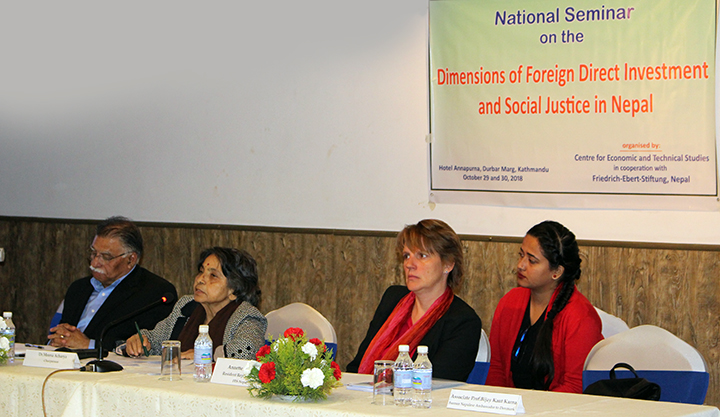
Dr. Pokharel also elaborated on the history of FDI and its current FDI trend in Nepal, changed global and regional context, and the contribution of FDI on social justice. He opined that “Nepal’s development achievements so far are attributed to economic and political liberalism with multiple competing national and international actors.”
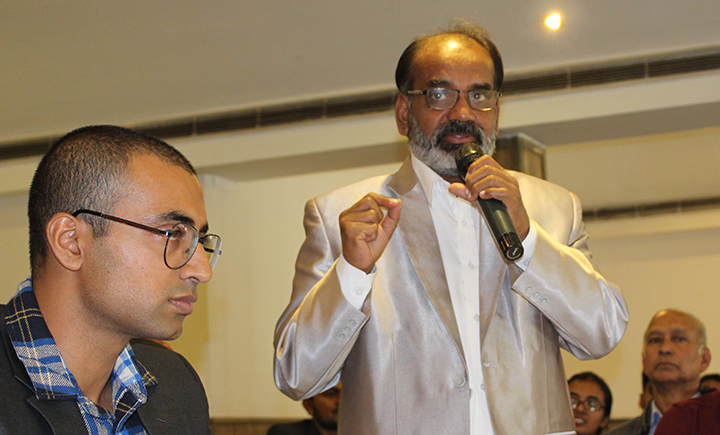
However, explaining the risks in FDI, Dr. Pokharel posed a question, “How will the state conduct negotiations to ensure social justice when it comes to big foreign investment?” He further put a set of questions for all to ponder over: “Who will set the agenda and the rules of investment game? Rulers of weak, illiberal, authoritarian states have often bent under powerful investors’ interest and pressure. What are the risks of such pressure in Nepal and how can it be avoided?”
Dr. Pokharel further noted that “Reform has been the key to ensure continuity and resilience under pressure” and wondered “How all this will be played out when the state is all powerful and other actors are weak.”
Economist Dr. Hari Bansh Jha presented paper on “Chinese investment in Nepal with focus on BRI and the experience of other countries in South Asia, Africa and South East Asia”.
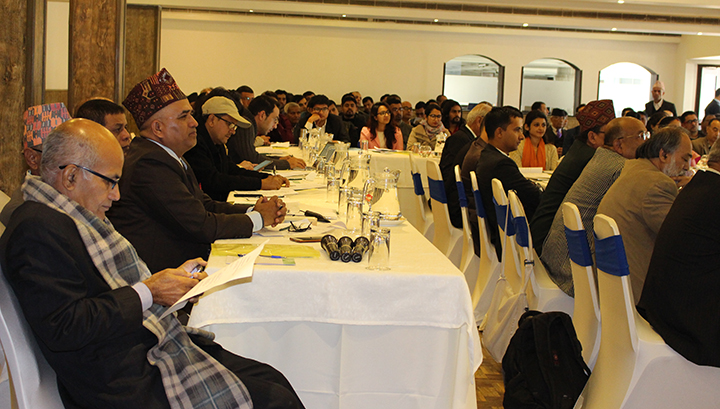
Giving rationale for foreign investment in any country, Dr. Jha stated that “ All the countries, big or small, promote investment as it plays a crucial role in capital formation and in increasing production, generating employment opportunities and boosting exports” and added “Foreign investment is required when the domestic investment proves inadequate in meeting the requirements.”
Commenting on Belt and Road Initiative of China, Dr. Jha was of the opinion that “there was no serious debate in Nepal about geo-economic and security implications of joining BRI club”. Dr. Jha further expressed his view that “There is a lack of transparency in BRI projects at the global level, including in Nepal. As such, broader debates need to be invited on BRI financing modality before any negotiation for its implementation takes place.”
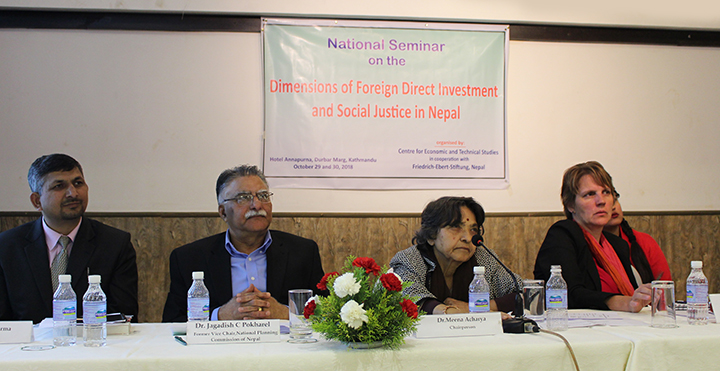
Madhukar S. Rana, economist and former finance minister, made presentation on behalf of Atul K. Thakur on “Indian Investment in Nepal : Keeping High Promises, Coping Big Challenges”.
Thakur, who is deputy secretary at PHD Chamber of Commerce and Industry in New Delhi, India, stated that “the fundamentals of understanding should not be changed, that India-Nepal relations are kept safe through the multi-layer engagements and the same should not continue giving the much needed traction to economic cooperation”.
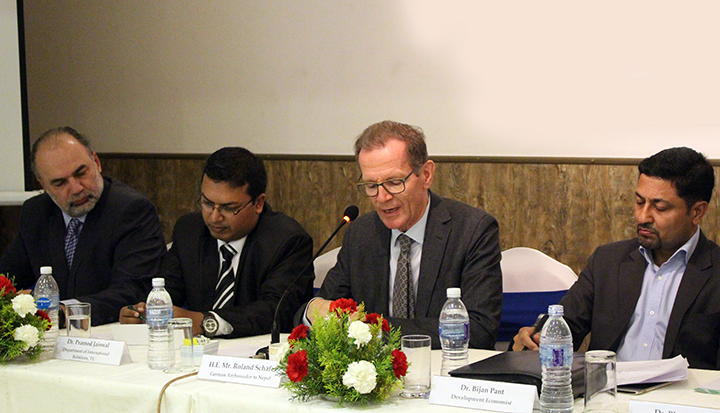
Commenting on delay or non-action in projects with Indian investment Mr. Thakur emphasized that “it is imperative that India comes in terms with the issues stalling its inland power and infrastructure projects in Nepal and positively resolve them on priority basis”. Mr. Thakur further stated that “the stalled Indian projects have had earned bad reputation and harmed India’s larger interest in Nepal. This is something not to be overlooked.”
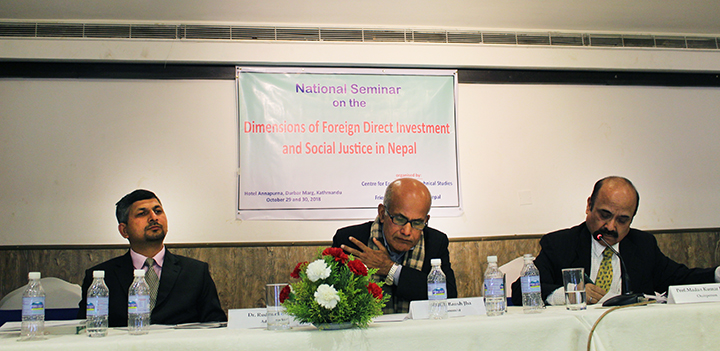
Prof. Ram Prasad Gyanwaly from the Central Department of Economics, Tribhuvan University, presented a paper on “FDI Inflow in Nepal with Special Reference to Western Countries and Social Development.”
He stated the share of the West “in the total stock of FDI is more than 56 percent in Nepal” and added that though the West made “handsome proportion of investment in Nepal but they have invested in service sector which has less forward and backward linkages than the industrial and the agricultural sectors.”
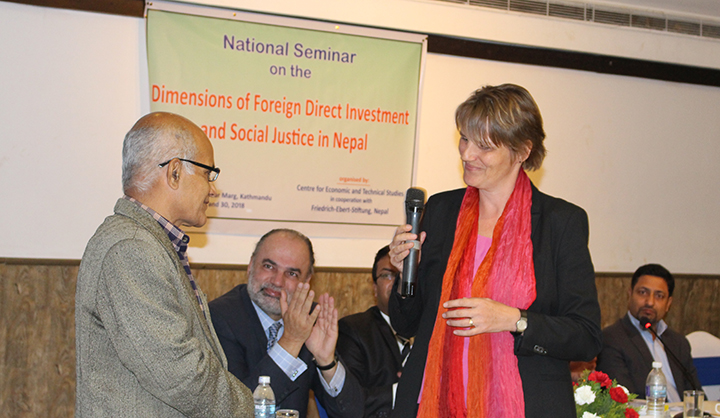
Dr. Gyanwaly noted that “Healthy life is the sign of social development. Investors will make investments in a country where the quality of life is high. Higher the quality of life, higher will be the productivity of human capital and hence higher will be the return from investment”. He also asserted that “foreigners will make the investment where the social development is high” and pointed out that “basically they focus on level of infrastructure, level of human capital, market size, higher quality of life and stable economy.”
Dr. Gyanwaly further observed that “Social development has been positively impacting the FDO inflow in Nepal. Human development, market size and infrastructure have statistically significant positive correlation with FDI inflow in Nepal.” He further opined that “Socially just development is attracting FDI inflow in Nepal”.
The commentators in different sessions included Dr. Rudra Sharma, advocate; Dr. Meena Acharya; Prof. Madan Kumar Dahal, economist; Binayak Basnyat, programme associate at Asia Foundation; Prof. Dr. Meena Vaidya Malla; and, Dr. Minendra Rijal, former minister.










